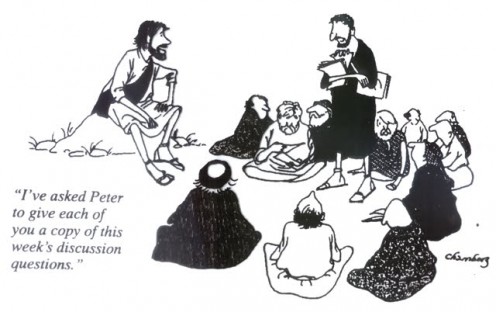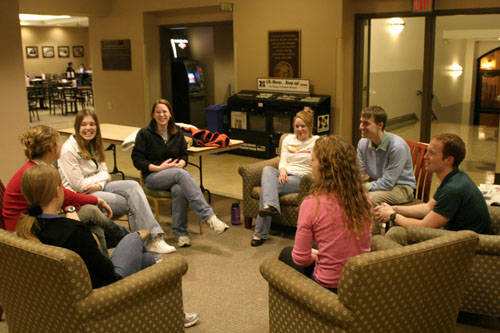Christian Small Group Ministry Ideas - The Bibles Design and Dynamics for Church Small Groups.
Small group ministries
(c) 2011 Small group design and dynamics
Hill Consulting Group used with permission.
Creating a church culture that fosters deeper community, connectivity, and love is indispensable to the overall health of a body of believers. Many churches today lean on the small group ministry model to achieve this goal. Small groups, if used correctly, can create an intimate family feeling even in mega churches.
Having a thriving small group ministry requires the implementation of many small group ideas and crucial elements. This article will focus on:
The biblical blueprint where to find small groups in the bible.
The design and dynamics of small group ministry in the local church.
Some key elements to building a strong, sustainable, replicable small group ministry.
We will also be looking at some solid practical small group ministry ideas.
We'll end the article with some great additional small group resources you can refer to.

What is the biblical basis for small groups?
Small groups were integral to early church structure. As we read through the following scriptures we see that this wasn't an isolated occurrence we see that small groups were vital to the daily life and health of the early church.
- “All the believers were together and had
everything in common…every day they continued to meet together in the temple
courts. They broke bread in their homes and ate together with glad and sincere
hearts, praising God and enjoying the favor of all the people. And the Lord
added to their number daily those who were being saved.”
Acts 2:44-47 - “Day after day, in the temple courts and from
house to house, they never stopped teaching and preaching the good news that
Jesus is the Christ!”
Acts 5:42 - “You know that I have not hesitated to preach
anything that would be helpful to you but have taught you publicly and from
house to house.”
Acts 20:20

Jesus modeled small group life with the twelve disciples
The relational level with which Jesus carried out His early ministry is our best model for small groups. He choose to keep His inner circle small. We see in this scripture a wonderful description of a small group in its simplest form. They did life together.
“Then He appointed twelve, that they might be with Him
and that He might send them out to preach.” Mark 3:14
Four key reasons to use small groups
- Theologically—Small groups are a simple and dynamic way for God to express His character and ministry.
- Biblically—Small groups are the most important activities in the New Testament
- Historically—Small groups have aided church growth for centuries
- Practically—Small groups integrate and simplify the ministry of the local church.
Why small groups?
Here are seven solid reasons to use small groups. These verses layout a biblical foundation for small groups that is undeniable. The level of impact small groups make will be obvious.
- They meet the need for a biblical pattern. Acts 20:20
- They meet the need for intimate personal relationships. Eccl. 4:9-11
- They meet the need for individual expression. I Cor. 14:26
- They meet the need for effective evangelism. John 4:37
- They meet the need for accelerating spiritual growth. Ephesians 4:16
- They meet the need for developing leaders. II Timothy 2:2
- They meet the need for releasing every believer into ministry. Ephesians 4:12
Bonus reason: - They can meet the need for an emergency alternative. Using the network in place in times of emergency quick contact to a large number of people is swift and effective. Small group communications are a huge bonus to a growing church.
Any common interests?



What Kind of Group is it?
Deciding what kind of group it is or is going to be is vital to the longevity of your small group. Defining who you are and who you're going to target allows for a greater ability to become good at it. Staying focused in the early stages lets you get flexible later on. Here are some examples of common small group types. The list could be exhaustive, but the list below outlines three broad group types and will serve as a good frame work to help you choose.
Contact Group
- Mature Christians meet unbelievers at a point of their felt needs. Could be discipleship, mentoring, family or marriage issues. This group is set up to pour directly into people specifically where their greatest need is.
Limited Christian Group - Is it going to be solely a group that focuses on christian living to some degree. It is designed to be very specific and stick to one theme. Examples could include:
- Worship Group
- Bible Study Group
- Prayer Group
- Sunday School class
- Fellowship Group
Support Group
- Mature Christians minister to Christians and unbelievers at the point of special ministry needs. This group may include a single mother, widow or shut in ministry. It could include a soup kitchen, food bank, or another psychical needs based group. This group could also include some type of support group to single mothers or those who need a helping hand. This list usually tugs on the heart string of people and the focus is on serving more than being served.
Small Group Poll
Do you attend church regularly? (At least twice a month)
Do you participate in a small group?
Do you lead a small group?
Popular Small Group Models
There is an endless list of small group choices online and any book store. I've tried quit a few out over the years. I've listed my top choice, popular models I know others are very happy with, and a few bonus ones for you to think about.
My top choice:
Sermon based small groups are my absolute highest rated small group type. They use the sermon from the previous week and dig in deeper. Sometimes simply using a couple questions to generate discussions. There are so many benefits from this type of small group approach let me name just a few; highly adaptable, everyone attending is already familiar and will naturally input more, group facilitators have an easier time preparing, the small group type can adjust to this simple sermon based curriculum and not have to change their format or how they meet (i.e. small group around coffee, new mothers small group, retired businessmen, or knitting partners all have different dynamics but they can all adapt to using this style).
Some very popular models/styles worth checking out
- Discipleship Group – G12 Groups (Bogota, Columbia)
- Traditional Cell Groups (Seoul, Korea)
- Sunday School or Bible Study groups (Saddleback etc.)
- Affinity Groups (doing stuff together and incorporating a book or bible study)
- Free Market (New Life; Haggard)
Important things to remember
When leading a small group:
Ask the right questions
- Limit the use of closed questions that elicit short, specific answers.
- Open questions provide an opportunity for interaction.
Learn to Listen
- Seek first to understand, then to be understood.
- Show interest with your posture.
- Listen to what is not said.
- Refuse to answer your own questions.
- Invite further responses.
Small groups meet the needs of the local church
The small group format can be utilized by any church of any size. It's flexible enough to meet the needs of even the most complex congregation. There are so many models to choose from that the possibilities are nearly endless. With a little elbow grease and a good team of volunteers assimilating a small group ministry into the culture of your churches heartbeat could happen this year. Go for it! Watch how relationships, community, and growth just naturally happen.
It's important to take the time to see what others are doing, but let God show you the best small group ministry approach for your church. Your church has a unique heart beat and culture. You can learn to harness this with much success though small groups.
Below the comment box are some great additional resources you can refer to. These articles are current and relevant to what's going on today with small groups.
Leave me a comment - let's connect further. I'd love to hear what you've learned, what you're learning and how small groups have been a part of it.
- Todd
Small group ideas - done in a parody of the office
If you found this article helpful
Please vote it up, rank it, and share with your network.
Thank you!







